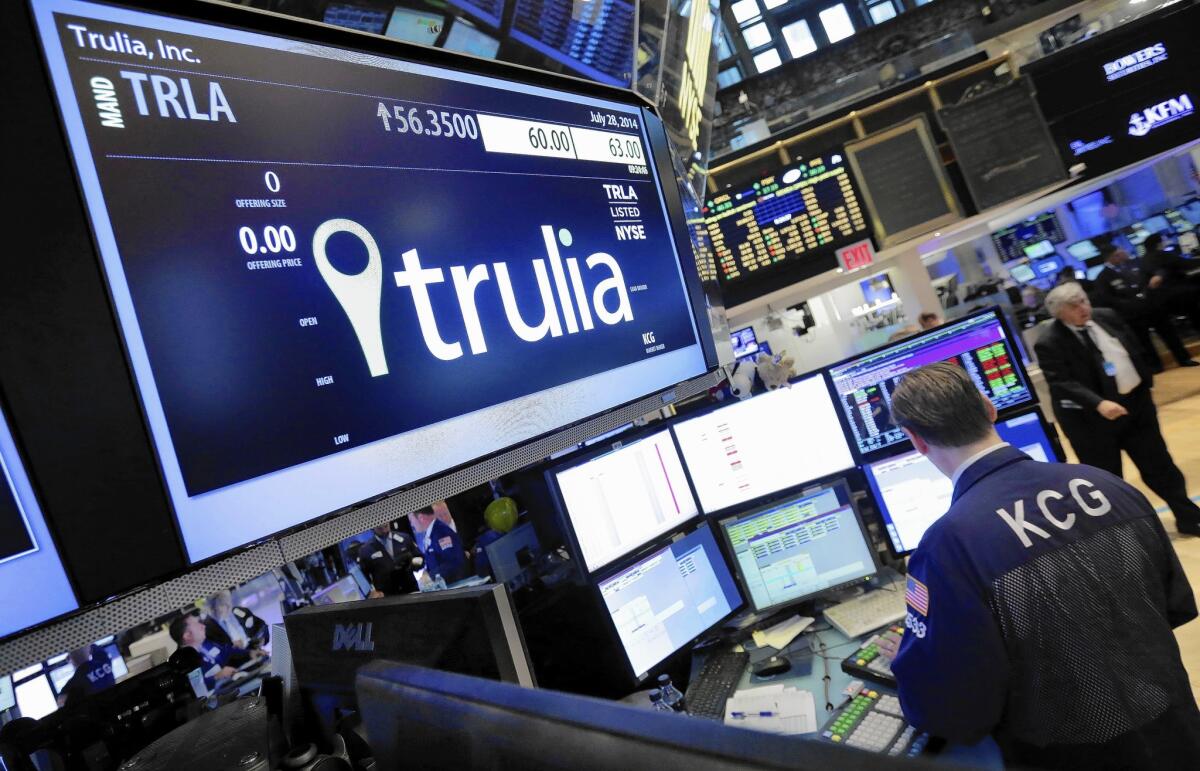Zillow deal to buy Trulia creates real estate digital ad juggernaut

By the time many home shoppers call a real estate agent, they’ve already got a short list of properties — and data to support the prices they want to pay.
Real estate information websites such as Zillow and Trulia have in short order revolutionized one of the world’s oldest transactions.
The $3.5-billion deal announced Monday for Zillow to buy Trulia creates a digital advertising juggernaut that could control more than 70% of online real estate searches. And it could further open up information about the market to buy and sell houses, while vacuuming up advertising dollars in the process. It also could add tension to the already uneasy relationship between the sites and some agents and brokerages.
Until recent years, agents had a monopoly on such market intelligence.
“Before sites like Zillow, buyers would come to our office and we’d tell them what was on the market,” said Mike Kelly of First Team Real Estate in Anaheim Hills. “Now they call us and say they want to go see houses they found themselves.”
Seattle-based Zillow Inc. and San Francisco-based Trulia both offer searchable databases of real estate data — complete with photo galleries and maps of recent neighborhood sales — to home shoppers free of charge. That has enabled the companies to carve out a lucrative piece of the $12 billion annually spent on real estate advertising.
Both sites charge agents for home listings and for preferred placement on their sites, inviting customers to get in touch for more details on a property.
Some worry that the new, bigger Zillow could charge more for advertising or that big brokerages could respond by pulling listings off the third-party sites. Zillow could someday become a marketplace itself, much as Amazon and Travelocity have.
Traffic on real estate listing websites and their mobile apps has grown fast in recent years as the sites have matured and the housing market has recovered.
Zillow and Trulia have come to dominate the market, combining for 68.4 million unique users in June, according to ComScore. The next biggest competitor — Move Inc., which is affiliated with the National Assn. of Realtors — had less than half of Zillow’s traffic and lagged behind Trulia by one-fourth.
After the deal, which is set to close next year, the two big sites will maintain their own brands and Web presence, Zillow Chief Executive Spencer Rascoff said Monday.
Neither is yet profitable separately, but they hope to save $100 million a year by joining forces and cutting duplicative costs.
The primary goal is to grab a bigger slice of the advertising market, and that’s where things may get tricky, said Brian Boero, a partner at real estate marketing firm 1000Watt Consulting.
“The irony is that these companies, which are militantly consumer-focused, get the large majority of their content and revenue from an industry that is still a little uneasy with them,” he said.
Most agents have come to accept the sites as partners, Boero said, but a vocal minority views them as a threat.
Some agents have long grumbled that Zillow, particularly, with its “Zestimate” algorithm of home values, gives buyers and sellers a skewed view of what a house is worth. That means some listings fall through the cracks, they argue.
A few big regional brokerages around the country have pulled their listings off the third-party sites entirely over concerns about accuracy and a desire to draw traffic to their own sites. And the National Assn. of Realtors this year pumped $35 million into an ad campaign for Move Inc.’s Realtor.com, touting the importance of accurate, local market information.
If the new, bigger Zillow aims to push higher advertising prices on agents, it will need to tread carefully, said Bradley Safalow, founder of PAA Research in New York.
“The market reaction from a broker and agent perspective could be nuclear,” he wrote in a note to clients last week, pointing out that big brokers could choose to cut ties with Zillow altogether and launch their own competing site.
A spokesman for Realogy Inc., which owns Century 21, Coldwell Banker and Sotheby’s, had no comment on the deal Monday. In a statement, the California Assn. of Realtors said it has concerns “that this merger will lead to fewer choices and higher advertising costs for our members and their clients.”
For a working agent, Zillow and Trulia can be tricky, said Tamara Suminski, president of the board of directors of the South Bay Assn. of Realtors.
They can be good advertising tools, and all of her customers are on the sites trying to better understand the market, she said. But there’s a limit to the consumer empowerment that such sites can provide.
Zillow’s algorithms can’t help a buyer understand more complex issues that affect value, such as the discount that they should expect for a home being in a seismic hazard zone. And buyers still need agents to help them navigate the mountains of legal paperwork that go with every deal.
“The information is there, and they’ve found a good way to advertise and create a business model that makes them a lot of money,” she said. “But the need for a Realtor I don’t think will ever go away.”
Buying and selling houses is still too local, and the transaction too complicated, for Zillow to sell houses directly the way that its e-commerce cousins Amazon and Travelocity do books and plane tickets, said Paul Habibi, a real estate lecturer at UCLA.
But such sites will continue to expand their impact and revenue as technology improves and consumers get more comfortable with it.
“It’s a matter of time until technology has the same impact on real estate that it’s had on other aspects of life,” Habibi said. “It’s not going to displace completely the role of the agent. But if [Zillow] can get to 10 to 20% of the market, they’d be doing amazingly well.”
For now, though, Zillow has no plans to get into the sales game. It’s a “real estate media company,” Rascoff said, focused on advertising and partnering with agents. For some of those agents, the partnership works quite well.
Cyndi Lesinski, an agent in Valencia, said she gets about 40% of her leads through Zillow since she joined its Premiere Agent program, paying a monthly fee to get better placement in search results.
The exposure she gets from Zillow and other websites such as Trulia and Yelp helped her leave a big Re/Max brokerage and launch a small boutique agency instead. It’s the way the industry is going, Lesinski said.
“You have to grow with it,” she said. “If you don’t embrace the change, you could be out of business.”







